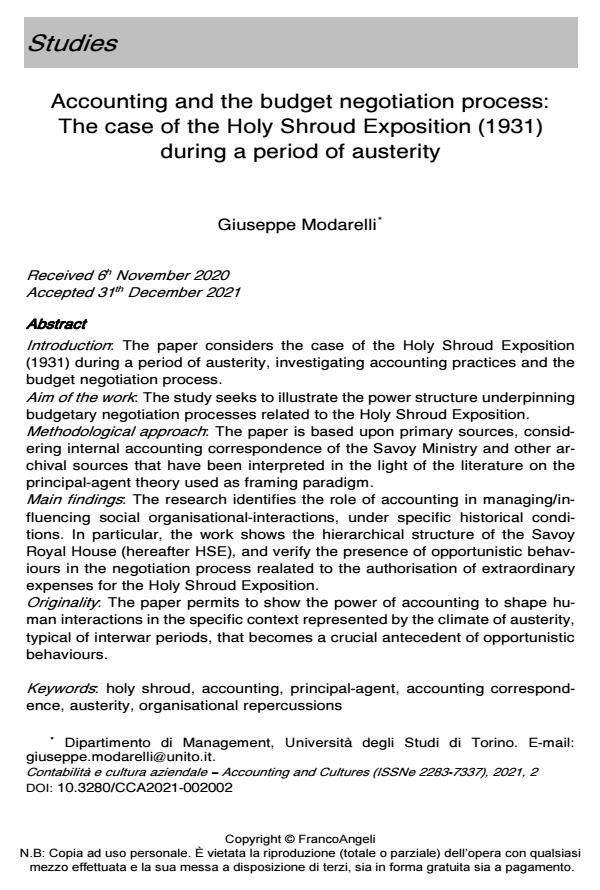Accounting and the budget negotiation process: The case of the Holy Shroud Exposition (1931) during a period of austerity
Titolo Rivista CONTABILITÀ E CULTURA AZIENDALE
Autori/Curatori Giuseppe Modarelli
Anno di pubblicazione 2022 Fascicolo 2021/2
Lingua Inglese Numero pagine 47 P. 7-53 Dimensione file 248 KB
DOI 10.3280/CCA2021-002002
Il DOI è il codice a barre della proprietà intellettuale: per saperne di più
clicca qui
Qui sotto puoi vedere in anteprima la prima pagina di questo articolo.
Se questo articolo ti interessa, lo puoi acquistare (e scaricare in formato pdf) seguendo le facili indicazioni per acquistare il download credit. Acquista Download Credits per scaricare questo Articolo in formato PDF

FrancoAngeli è membro della Publishers International Linking Association, Inc (PILA)associazione indipendente e non profit per facilitare (attraverso i servizi tecnologici implementati da CrossRef.org) l’accesso degli studiosi ai contenuti digitali nelle pubblicazioni professionali e scientifiche
Introduction: The paper considers the case of the Holy Shroud Exposition (1931) during a period of austerity, investigating accounting practices and the budget negotiation process. Aim of the work: The study seeks to illustrate the power structure underpinning budgetary negotiation processes related to the Holy Shroud Exposition. Methodological approach: The paper is based upon primary sources, considering internal accounting correspondence of the Savoy Ministry and other archival sources that have been interpreted in the light of the literature on the principal-agent theory used as framing paradigm. Main findings: The research identifies the role of accounting in managing/influencing social organisational-interactions, under specific historical conditions. In particular, the work shows the hierarchical structure of the Savoy Royal House (hereafter HSE), and verify the presence of opportunistic behaviours in the negotiation process realated to the authorisation of extraordinary expenses for the Holy Shroud Exposition. Originality: The paper permits to show the power of accounting to shape human interactions in the specific context represented by the climate of austerity, typical of interwar periods, that becomes a crucial antecedent of opportunistic behaviours.
Parole chiave:holy shroud, accounting, principal-agent, accounting correspondence, austerity, organisational repercussions
Giuseppe Modarelli, Accounting and the budget negotiation process: The case of the Holy Shroud Exposition (1931) during a period of austerity in "CONTABILITÀ E CULTURA AZIENDALE" 2/2021, pp 7-53, DOI: 10.3280/CCA2021-002002